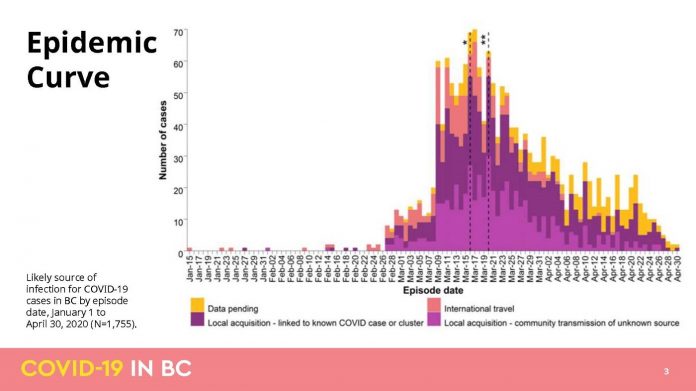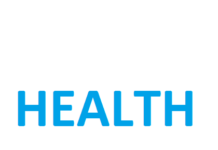“Our dynamic modelling shows us that we have been able to put the brakes on COVID-19, but we haven’t stopped the car”
HEALTH Minister Adrian Dix and Provincial Health Officer Dr. Bonnie Henry on Monday announced 53 new COVID-19 cases and three more deaths since Saturday.
They said: “Today, we are providing case updates for two 24-hour reporting periods: May 2 to May 3, and May 3 through to midday today.
“In the first reporting period through May 3, we had 34 new cases, for a total of 2,205 cases in British Columbia.
“In the last 24 hours, we have had a further 19 new cases, for a total of 2,224 cases in British Columbia.”
There were three new COVID-19 related deaths, two in the Fraser Health region and one in Vancouver Coastal Health region, for a total of 117 deaths in British Columbia.
Every health region in British Columbia has patients with COVID-19: 845 are in the Vancouver Coastal Health region, 1,027 are in the Fraser Health region, 124 are in the Vancouver Island Health region, 177 are in the Interior Health region and 51 are in the Northern Health region.
In the last day, there have been no new long-term care or assisted-living facility outbreaks. In total, 19 facilities and three acute-care units have active outbreaks, with outbreaks now declared over at 14 care facilities.
Public health teams are also providing support to a number of community outbreaks, actively contact tracing those who may be directly affected and their close contacts.
There are seven confirmed positive cases at Fraser Valley Specialty Poultry, 54 at Superior Poultry in Coquitlam and 35 employees confirmed positive at United Poultry in Vancouver.
There are also 134 inmates and staff confirmed positive at the Mission Institution federal correctional centre, as well as 15 positive cases of COVID-19 connected to the Kearl Lake plant in Alberta.
To date, 1,417 people who had tested positive for COVID-19 have recovered.
Of the total COVID-19 cases, 77 individuals are hospitalized, and 20 of those are in intensive care. The remaining people with COVID-19 are recovering at home in self-isolation.

DIX and Henry noted: “As we look at the epidemiology of COVID-19 over the past four months, we can see how the virus has affected people in British Columbia. What we know is that every region of the province has been impacted. We also know that severe illness is most prevalent with our seniors and Elders, men over 50 and those with chronic underlying health conditions.
“Our health system transformed in a matter of weeks to prepare and respond to COVID-19 and remains ready for all critical care patients, including those with COVID-19. At the same time, we have increased our provincial critical care and portable ventilators to sustain an enhanced level of readiness.

“Our dynamic modelling shows us that we have been able to put the brakes on COVID-19, but we haven’t stopped the car. It also highlights that we must maintain safe physical distancing to keep our curve flat.
“The toll of COVID-19 has been felt by all of us. This week, as Canadian Mental Health Week, is a reminder that we must also continue be vigilant about our mental health.
“Many are concerned that we are not moving quickly enough to reopen our province, and just as many are fearful that moving too quickly will set us back to untenable levels. It is a careful balance and one that we are working hard to achieve. And, it will require every one of us to fully participate to make our ‘new normal’ a success.
“Until we have a vaccine available for everybody, COVID-19 is going to be in B.C. This means our ‘new normal’ must continue to protect our health and well-being, protect our health-care system, create opportunities for increased social interaction and allow for the rebuilding of our economy with the cautious easing of restrictions.
“Our ‘new normal’ is based on principles that apply to every person and every situation. These principles are the foundation of how we need to move forward with our B.C. plan and will remain in place in the weeks and months ahead.
“These principles include:
* staying informed, being prepared and following public health advice;
* practising good hygiene – hand hygiene, avoid touching your face and respiratory etiquette;
* staying at home and away from others if you are feeling ill – not ever going to school or work;
* maintaining physical distancing outside the household, e.g., no handshakes or hugs, and keeping your number of contacts low and keeping a safe distance;
* making necessary contacts safer with appropriate controls, e.g., using plexiglass barriers or redesigning spaces;
* increasing cleaning of frequently touched surfaces at home and work;
* considering the use of non-medical masks in situations where physical distancing cannot be maintained, such as on transit or while shopping; and
* continuing to reduce personal non-essential travel.
“As you think about your personal go-forward plan, think of your connections as the rings on a tree. One additional connection or ring makes for a much bigger risk of exposure and transmission.
“Adding just one person into your circle adds all of the people from their circle – from their home, their work or others they have close contact with. If you or someone in your household is high risk, the less interaction you have with others, the better you can protect them.
“We are nearing the end of our beginning. We have learned, we have prepared and we have done our best to break the chain of transmission. We are now entering a new phase where we must be equally vigilant and equally committed to protecting our loved ones, our seniors and Elders, our health-care workers and our communities.
“It is in our hands, as long as we do not forget to wash them, to make this summer the B.C. summer of renewal.”
The latest modelling presentation and information is available online:
http://www.bccdc.ca/health-info/diseases-conditions/covid-19/modelling-projections












